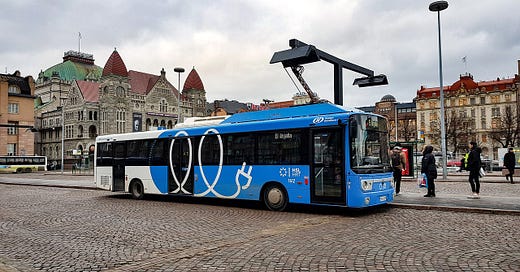The cities with all-electric bus fleets are shielding themselves from big oil
Cape Town's Golden Arrow bus service aims to escape from "fuel price volatility precipitated by oil cartel dynamics".
In 2017, Shenzhen, China, became the world’s first major city to have an all-electric bus fleet — a major step in the nation’s “war on pollution” and harmful smog.
By the time it had finished decarbonising its bus fleet, Shenzhen had 16,000 electric buses on its roads, and 510 charging stations.
“Shenzhen’s bus network was able to go all-electric thanks to the generous national and local government subsidies given to public transport companies,” according to a report by the World Economic Forum.
While electric buses cost more upfront, their operating costs are significantly lower than petrol- or diesel-powered ones. This is because they require less maintenance as they have fewer moving parts, and do not require a constant supply of fuel.
To get around the upfront cost challenge, some bus operators in Shenzhen leased, rather than bought, vehicles from manufacturers, according to the World Economic Forum.
The city itself assisted by investing in bus operations and charging infrastructure.
Now, others are now racing to catch up as they seek to reduce air pollution, improve public health outcomes, meet their climate goals, and break the link between rising fuel prices and transport costs.
Oslo, Norway, says it will complete the shift to a fully electrified bus fleet by the end of 2023 — several years ahead of schedule. The country is already a leader in the adoption of electric passenger vehicles, with more than 90% of new car sales now battery powered.
Copenhagen, Denmark, plans to have an all-electric fleet by the end of 2025, according to media reports.
Meanwhile, Cape Town’s Golden Arrow bus service plans to fully electrify its fleet over the next few years. It has already installed solar panels at its depots in preparation — an important undertaking considering South Africa’s unreliable and polluting national power grid.
Frontier Transport, which operates the bus service, recently acquired one electric bus and the company’s board has approved the purchase of 62 additional ones.
This'll shield Golden Arrow and its passengers from "fuel price volatility precipitated by oil cartel dynamics,” the group says.






A great initiative! I first heard of it at the 2022 - Electric Mobility Congress SA and seen them on route in Cape Town trials. Apparently, commuters are preferring to ride in the EV busses and will wait for them!